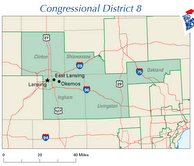Congress has been racing to wrap things up before Easter recess... apparently, chocolate bunnies are a powerful bipartisan motivator.
The $3 trillion+ budget passed both houses in a party-line vote and moved on to conference committee. The vote tallies came as no suprise, and Republican House members knew that they ran zero risk in voting against it. In a vain attempt to be relevant, though, House Majority leader Boehner came up with an alternative budget (optimistically titled, The Road to Recovery) which was roundly mocked for both its lack of numbers and its quaint faith in tax cuts. It died a quiet death, not even getting much respect from its own party. In an interesting aside, Glenn Thrush noted that:
Defectors: About twice as many Republicans (38 or 20 percent of their conference) voted against the GOP alternative budget -- than Democrats (20 or 8 percent) who nixed their party's spending plan
With no traction on the budget, Republican reps have turned their energies to grumbling about the Waxman-Markey climate change legislation proposal.
Cap and trade of carbon dioxide emissions is a major component of the proposal. In a nutshell, this is a market-based way to control pollution. A cap (maximum limit) is set for emissions, then sources (manufacturers, utilities, etc.) are given a specific emissions allowance. Each source can design its own plan to stay within its specific allowance, such as investing in better pollution controls and increasing efficiency. Sources that don't "spend" their entire allowance can sell the extra to other less-efficient sources. The EPA lists the benefits of this approach:
- Strict limits on emissions yielding dramatic pollution reductions;
- High levels of compliance, transparency, and complete accountability;
- Regulatory certainty and flexibility for sources;
- Incentives for early pollution reduction and innovations in control technologies;
- Compatibility with state and local programs;
- Significant, widespread, and guaranteed human health and environmental benefits;
- Efficient use of government resources, and
- More benefits at less cost.
This isn't just some pointy-headed academic theory -- cap and trade has successfully reduced levels of several types of pollutants for over a decade.
Meme alert: Mike Rogers has decided to get cranky about cap-and-trade, or as he prefers to call it, "cap and tax."
Always fond of the fact-free policy statement, Mr. Rogers has been sounding the alarm about carbon cap and trade. He's been busy warning that it will "devastate jobs in manufacturing states like Michigan" and be "economic suicide." [Note to Mr. Rogers: Michigan has lost 600,000 auto jobs over the last 8 years, when carbon cap-and-trade was nowhere in sight.]
If you're up for it, there's even a Mike Rogers video with his oh-so-gloomy predictions and misleading "statistics"... just keep in mind that consumers already pay every time "they put food in the refrigerator to keep it cold" or "turn on the computer to help kids with their homework." What's wrong with providing the same electrical capacity with less pollution? And wouldn't this market-based solution to reduce greenhouse gases actually promote clean energy job growth? Funny, but Mr. Rogers used to think that was a good idea. He even included it in his super-duper Energy Independence cartoon.
Word in the Neighborhood is that Mr. Rogers will hold a joint "town hall" style meeting with State Reps. Bill Rogers and Cindy Denby during Easter recess. If this actually happens, we'll be sure to ask Mike Rogers about his change of heart on clean energy policy and job growth.





No comments:
Post a Comment